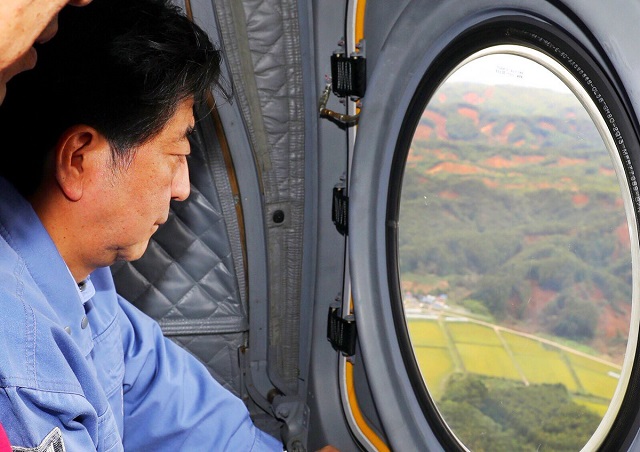Will Abe’s agenda affect Japan?
Posted By Tobias Harris on September 17, 2018 @ 12:49

On 20 September, Japan’s Prime Minister Shinzo Abe is expected to win an overwhelming victory over long-time rival Shigeru Ishiba in his bid for a third three-year term as leader of the ruling Liberal Democratic Party (LDP). But it is after the votes are counted that Abe will face a harder fight: maintaining his power over the political agenda as his party begins looking ahead to the term-limited prime minister’s exit from office in 2021.
The problem is that it isn’t clear whether Abe has anything new to offer Japanese voters after six years in power. Looking at what Abe has said about his third-term agenda during the run-up to the LDP election, it seems that at this point Abe is mostly focused on completing unfinished business from earlier in his tenure rather than launching major new initiatives.
The most obvious example is constitutional revision. In May 2017, Abe called for revisions to Japan’s constitution to be ratified by 2020 and articulated a set of modest amendments that seemed intended largely to defang any resistance to revision. That process had run aground this year thanks to opposition to revision from within the government and fallout from the allegations of influence-peddling that dogged Abe and occupied much of the National Diet’s attention during the first half of the year.
Not surprisingly, having sought revision throughout his career, Abe is prepared to try again. In a speech [1] in his home prefecture of Yamaguchi on 12 August, he stated that the ruling party should submit its four planned changes to the Diet as early as the extraordinary session that will begin soon after the party election.
It’s similarly difficult to find ambitious new ideas in either his economic or foreign policies. Abe has discussed [2] the need for additional changes to Japan’s labour system, particularly regarding continuing opportunities for senior citizens and social security reform to control rising healthcare and pension costs. But these are not new issues; they were key planks of his October 2017 general election manifesto. In macroeconomic policy, the heart of Abenomics, the main focus for the next year will be ensuring that the 2% consumption tax hike planned for October 2019 doesn’t undercut growth and inflation.
Abe may have a freer hand in foreign policy, and managing an increasingly turbulent global system will be increasingly important during his third term, but it doesn’t appear as if he has new diplomatic initiatives to pursue. Abe has touted [3] his efforts to—in words that evoke Yasuhiro Nakasone, another long-serving conservative prime minister—‘settle the accounts of post-war Japanese diplomacy’, including stabilising Japan–China relations [4], resolving the abductee and nuclear issues with North Korea and working towards a peace treaty with Russia. While the effort to improve ties with Beijing appears to be increasingly central to Abe’s foreign policy goals—and will likely receive a boost when he visits China in October—these are unfinished and ongoing projects, not new aims.
Meanwhile, in foreign economic policy, after Abe helped guide the post-US [5] Comprehensive and Progressive Agreement for the Trans-Pacific Partnership and Japan’s economic partnership agreement with the European Union to completion, his government’s agenda may have to focus more on consolidating these gains rather than seeking out new agreements. Abe’s government may be increasingly interested in concluding the Regional Comprehensive Economic Partnership, but corralling the deeply divided 16-country group may be beyond Tokyo’s reach in the near term. More important will be resisting US demands for one-sided and politically difficult concessions—and perhaps also defending the World Trade Organization [6] against US attempts to weaken the multilateral body.
Ultimately, Abe’s relatively modest ambitions for his third term may implicitly reflect the political constraints facing a leader running in his last leadership race. This is not unique to Abe or Japan. Having pushed and cajoled his party to follow him for six years, centralising power in the process, the LDP’s backbenchers may simply be more reluctant to follow his lead quietly. Even before the party election there have been stirrings of discontent as ambitious party leaders seek to reclaim some control over the political agenda.
The political calendar could further complicate Abe’s leadership. In the year following the LDP election, Abe will face nationwide local elections, the transition to a new emperor (which could make the public particularly resistant to divisive political initiatives like constitutional revision), upper house elections and a consumption tax hike on 1 October 2019—at which point attention will turn to the run-up to the Tokyo Olympics in July 2020. Once the Olympics are past, Abe will have just over a year left in his term and the LDP will likely be fully consumed in the race to succeed the prime minister in 2021.
If next year’s upper house elections go poorly for the LDP, Abe could find himself constrained by both the ruling coalition and the opposition, especially regarding constitutional revision. The very fact of an impending upper house election also makes it unlikely that the Diet will pass revisions before next summer.
Abe may be poised to secure his party’s vote in a landslide on Thursday, but his victory may mark the beginning of the end of his time as an effective prime minister instead of inaugurating a new era of energetic leadership.
Article printed from The Strategist: https://www.aspistrategist.org.au
URL to article: https://www.aspistrategist.org.au/will-abes-agenda-affect-japan/
URLs in this post:
[1] speech: https://www.sankei.com/premium/news/180814/prm1808140008-n1.html
[2] discussed: https://www.nikkei.com/article/DGXMZO34935000T00C18A9PP8000/?n_cid=DSREA001
[3] touted: http://www.sankei.com/politics/news/180910/plt1809100050-n2.html
[4] Japan–China relations: http://www.eastasiaforum.org/2018/09/07/xi-and-abe-guarantors-of-chinese-japanese-entente/
[5] post-US: http://www.eastasiaforum.org/2018/09/02/can-tokyo-survive-trump/
[6] defending the World Trade Organization: http://www.eastasiaforum.org/2018/09/05/us-japan-cracks-are-starting-to-show/
Click here to print.